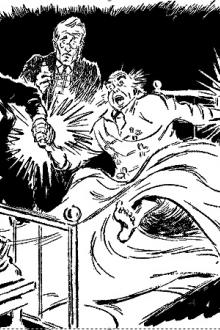The Face and the Mask, Robert Barr [best books to read for beginners .TXT] 📗

- Author: Robert Barr
Book online «The Face and the Mask, Robert Barr [best books to read for beginners .TXT] 📗». Author Robert Barr
"Certainly," said the captain. "Please shut the door, Sir John."
* * * * *
Meanwhile there was a lively row on board the Vulcan. In the saloon Capt. Flint was standing at bay with his knuckles on the table.
"Now what the devil's the meaning of all this?" cried Adam K. Vincent, member of Congress.
A crowd of frightened women were standing around, many on the verge of hysterics. Children clung, with pale faces, to their mother's skirts, fearing they knew not what. Men were grouped with anxious faces, and the bluff old captain fronted them all.
"The meaning of all what, sir?"
"You know very well. What is the meaning of our turning-round?"
"It means, sir, that the Adamant has eighty-five saloon passengers and nearly 500 intermediate and steerage passengers who are in the most deadly danger. The cotton in the hold is on fire, and they have been fighting it night and day. A conflagration may break out at any moment. It means, then, sir, that the Vulcan is going to stand by the Adamant."
A wail of anguish burst from the frightened women at the awful fate that might be in store for so many human beings so near to them, and they clung closer to their children and thanked God that no such danger threatened them and those dear to them.
"And dammit, sir," cried the Congressman, "do you mean to tell us that we have to go against our will--without even being consulted--back to Queenstown?"
"I mean to tell you so, sir."
"Well, by the gods, that's an outrage, and I won't stand it, sir. I must be in New York by the 27th. I won't stand it, sir."
"I am very sorry, sir, that anybody should be delayed."
"Delayed? Hang it all, why don't you take the people on board and take 'em to New York? I protest against this. I'll bring a lawsuit against the company, sir."
"Mr. Vincent," said the captain sternly, "permit me to remind you that I am captain of this ship. Good afternoon, sir."
The Congressman departed from the saloon exceeding wroth, breathing dire threats of legal proceedings against the line and the captain personally, but most of the passengers agreed that it would be an inhuman thing to leave the Adamant alone in mid-ocean in such terrible straits.
"Why didn't they turn back, Captain Flint?" asked Mrs. General Weller.
"Because, madam, every moment is of value in such a case, and we are nearer Queenstown than New York."
And so the two steamships, side by side, worried their way toward the east, always within sight of each other by day, and with the rows of lights in each visible at night to the sympathetic souls on the other. The sweltering men poured water into the hold of the one and the pounding pumps poured water out of the hold of the other, and thus they reached Queenstown.
* * * * *
On board the tender that took the passengers ashore at Queenstown from both steamers two astonished women met each other.
"Why! Mrs.--General--WELLER!!! You don't mean to say you were on board that unfortunate Vulcan!"
"For the land's sake, Mrs. Assistant Brownrig! Is that really you? Will wonders never cease? Unfortunate, did you say? Mightily fortunate for you, I think. Why! weren't you just frightened to death?"
"I was, but I had no idea anyone I knew was on board."
"Well, you were on board yourself. That would have been enough to have killed me."
"On board myself? Why, what do you mean? I wasn't on board the Vulcan. Did you get any sleep at all after you knew you might go down at any moment?"
"My sakes, Jane, what are you talking about? Down at any moment? It was you that might have gone down at any moment or, worse still, have been burnt to death if the fire had got ahead. You don't mean to say you didn't know the Adamant was on fire most of the way across?"
"Mrs.--General--Weller!! There's some horrible mistake. It was the Vulcan. Everything depended on her bulkheads, the captain said. There was a hole as big as a barn door in the Vulcan. The pumps were going night and day."
Mrs. General looked at Mrs. Assistant as the light began to dawn on both of them.
"Then it wasn't the engines, but the pumps," she said.
"And it wasn't the steam, but the fire," screamed Mrs. Assistant. "Oh, dear, how that captain lied, and I thought him such a nice man, too. Oh, I shall go into hysterics, I know I shall."
"I wouldn't if I were you," said the sensible Mrs. General, who was a strong-minded woman; "besides, it is too late. We're all safe now. I think both captains were pretty sensible men. Evidently married, both of 'em."
Which was quite true.
THE DEPARTURE OF CUB MCLEAN.
Of course no one will believe me when I say that Mellish was in every respect, except one, an exemplary citizen and a good-hearted man. He was generous to a fault and he gave many a young fellow a start in life where a little money or a few encouraging words were needed. He drank, of course, but he was a connoisseur in liquors, and a connoisseur never goes in for excess. Few could tell a humorous story as well as Mellish, and he seldom dealt in chestnuts. No man can be wholly bad who never inflicts an old story on his friends, locating it on some acquaintance of his, and alleging that it occurred the day before.
If I wished to write a heart-rending article on the evils of gambling, Mellish would be the man I would go to for my facts and for the moral of the tale. He spent his life persuading people not to gamble. He never gambled himself, he said. But if no attention was paid to his advice, why then he furnished gamblers with the most secluded and luxurious gambling rooms in the city. It was supposed that Mellish stood in with the police, which was, of course, a libel. The idea of the guardians of the city standing in with a gambler or a gambling house! The statement was absurd on the face of it. If you asked any policeman in the city where Mellish's gambling rooms were, you would speedily learn that not one of them had ever even heard of the place. All this goes to show how scandalously people will talk, and if Mellish's rooms were free from raids, it was merely Mellish's good luck, that was all. Anyhow, in Mellish's rooms you could have a quiet, gentlemanly game for stakes about as high as you cared to go, and you were reasonably sure there would be no fuss and that your name would not appear in the papers next morning.
One night as Mellish cast his eye around his well-filled main room he noticed a stranger sitting at the roulette table. Mellish had a keen eye for strangers and in an unobtrusive way generally managed to find out something about them. A stranger in a gambling room brings in with him a certain sense of danger to the habitues.
"Who is that boy?" whispered Mellish to his bartender, generally known as Sotty, an ex-prize fighter and a dangerous man to handle if it came to trouble. It rarely came to trouble there, but Sotty was, in a measure, the silent symbol of physical force, backing the well-known mild morality of Mellish.
"I don't know him," answered Sotty.
"Whom did he come in with?"
"I didn't see him come in. Hadn't noticed him till now."
Mellish looked at the boy for a few minutes. He had the fresh, healthy, smooth face of a lad from the country, and he seemed strangely out of place in the heated atmosphere of that room, under the glare of the gas. Mellish sighed as he looked at him, then he turned to Sotty and said:
"Just get him away quietly and bring him to the small poker room. I want to have a few words with him."
Sotty, who had the utmost contempt for the humanitarian feelings of his boss, said nothing, but a look of disdain swept over his florid features as he went on his mission. If he had his way, he would not throw even a sprat out of the net. Many a time he had known Mellish to persuade a youngster with more money than brains to go home, giving orders at the double doors that he was not to be admitted again.
The young man rose with a look of something like consternation on his face and followed Sotty. The thing was done quietly, and all those around the tables were too much absorbed in the game to pay much attention.
"Look here, my boy," said Mellish, when they were alone, "who brought you to this place?"
"I guess," said the lad, with an expression of resentment, "I'm old enough to go where I like without being brought."
"Oh, certainly, certainly," said Mellish, diplomatically, knowing how much very young men dislike being accused of youth, "but I like to know all visitors here. You couldn't get in unless you came with someone known at the door. Who vouched for you?"
"See here, Mr. Mellish," said the youth angrily, "what are you driving at? If your doorkeepers don't know their own business why don't you speak to them about it? Are you going to have me turned out?"
"Nothing of the sort," said Mellish, soothingly, putting his hand in a fatherly manner on the young fellow's shoulder. "Don't mistake my meaning. The fact that you are here shows that you have a right to be here. We'll say no more about that. But you take my advice and quit the business here and now. I was a gambler before you were born, although I don't gamble any more. Take the advice of a man who knows. It doesn't pay."
"It seems to have paid you reasonably well."
"Oh, I don't complain. It has its ups and downs like all businesses. Still, it doesn't pay me nearly as well as perhaps you think, and you can take my word that in the long run it won't pay you at all. How much money have you got?"
"Enough to pay if I lose," said the boy impudently; then seeing the look of pain that passed over Mellish's face, he added more civilly:
"I have three or four hundred dollars."
"Well, take my advice and go home. You'll be just that much better off in the morning."
"What! Don't you play a square game here?"
"Of course we play a square game here," answered Mellish with indignation. "Do you think I am a card-sharper?"
"You seem so cock-sure I'll lose my money that I was just wondering. Now, I can afford to lose all the money I've got and not feel it. Are you going to allow me to play, or are you going to chuck me out?"
"Oh, you can play if you want to. But don't come whining





Comments (0)